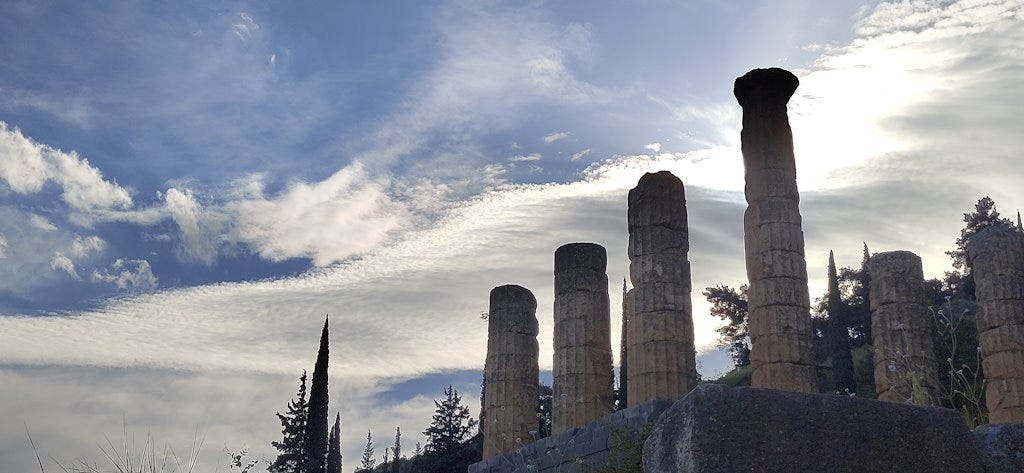(If you like this post, bless the Algorithm Angels and select the “heart” icon ❤️ even if you’re not a subscriber. It helps!)
It’s been six months since I began posting here on Deus in Fabula, which makes a good time to pause and take measure of where we’ve come. Doing so offers the opportunity to collect the posts in a different manner and look at them in groups.
It also provides an opportunity to remind you that although some of the posts are paywalled, I offer a tiered discounts all the way to 100% to provide access to the entire archive. Honestly, if you’re a free subscriber, what’s keeping you there? Nevertheless, I’ve removed the paywalls from older posts (through April), as I figure to do on a periodic basis.
Foundational posts
Now, because I’m a bit of a stickler for accuracy, I did start posting a little farther back than six months, starting with a few foundational pieces to establish what this newsletter is about:
Mystical Realism: joining the conversation introduced the idea of the conversation I’m still hoping to have through this newsletter. To date, that conversation’s been limited by a small subscriber base. I’m working on expanding that readership, but it’s slow going.
Mystical realism: motivations, inspirations, and opportunities offered a more personal background on why I’m interested in this “quest for spiritual, devotional, and mystical realism in fiction,” or, finding “simple, devotional stories that inspire people to seek God.” And I’ll repeat the call I made there: if you know of such stories, please let me know!
What do I mean by spiritual, devotional, and mystical realism? obviously explains this newsletter’s tagline, with the short version being, “the inner awareness of God's very real presence in ordinary, everyday life, in everyday situations and settings.” I also noted that this awareness is very much about not emotion, but calm feeling, and the simple goal, to quote C. S. Lewis in Surprised by Joy, is to help readers connect with an experience and say, “Hey, I’ve felt something like that! I thought it was just me!”
With those in place, the posts that followed went further into specific details and also began to exercise those ideas.

Stories and poems
Personally, my primary goal in this whole quest is not so much to write about the quest, but to use that quest to inform the fiction I want to write. Thus, as I’ve been asking the questions that have led to different essays, I’ve also been sharing stories and poems.
Stories
A matter of the heart, part 1 and A matter of the heart, part 2 were actually unplanned. Although the story is written in such a way that it could appear in fiction, it’s actually autobiographical: it relates my real experience of the night of March 11th, 2024. Nothing is made up. Indeed, other than faking it with AI, how would I manage to get pictures of a blood pressure monitor with specific numbers on it?
The sacred task (a short story) was a piece I originally wrote for a contest. I had fun here making the audio version so I could incorporate the snipping sounds that I’d recorded on my phone using my old pair of shears.
Wondrous: As I note in the introductory remarks, this story is inspired by the poem, The Offering. I originally wrote the story as a short fable but haven’t been satisfied with it. So, I’m using it as an opportunity to practice the deep expression of a character’s inner experience as I write and share one chapter at a time.
Poems
To be honest, I’ve posted these poems to (a) inject a little variety and (b) give myself more time to finish a post that hasn’t quite come together yet.
For which He waits (inspired by the ruins of the Sanctuary of Delphi, Greece)
Essays on mystical realism and craft
Alongside example stories and poems, the essays are really the heart of our “quest for spiritual, devotional, and mystical realism in fiction,” especially those that seek to clarify what the different components in that tagline mean:
The “mystical” aspect is discussed in Mythical, Magical, and Mystical.
The “devotional” part is treated in Emotion, inpletion, and devotion: part 1 and part 2
The “spiritual” part is probably the most complex to address, given the proliferation of what passes as “spiritual” and “spirituality.” Hence the series Genuine spirituality in fiction, part 1, part 2, part 3, and part 4 to get started.
In addition, many posts are more focused on the craft of incorporating mystical realism into fiction:
Mystical character arcs in fiction, part 1, part 2, and part 3, examines the static arc, the positive arc, and the negative arc in relation to a character’s spiritual growth and/or mystical experience.
Inner experience: a unique value of written stories demonstrates how written stories are really the only medium that can share directly in the thoughts of a character.
The privilege of writing inner experiences, part 1 and part 2, follows up from the post above by exploring the opportunity that writing fiction affords for an author’s spiritual growth.
Characters who don't how the story will end, part 1 and part 2, focuses on questions like “Why does God permit evil?” from the standpoint of a story’s author.
Three literary accounts of mystical union, part 1 and part 2, explores how this particular aspect of mystical experience can appear in literature, contrasting two essentially mind-born depictions with a genuine one.
It’s worth mentioning that I’ve generally split these essays into multiple parts to limit each one to a reasonable (that is, consumable) length. Do you have any opinions about this practice?
Reviews and Recommendations
I hope to do more of these in the future; what I have here thus far is at least a start:
One Year Adventure Novel (homeschool program)
Creating powerful settings (course)
The Art of Spiritual Writing (book)
Looking ahead
During the period when I got this newsletter started, my family and I traveled quite a bit—a trip to Albuquerque, NM and Boulder, CO in April to do college visits with our son, attending the One Year Adventure Novel Workshop in Olathe, KS in June, and then going to Washington state in August to visit family. But for the next eight months or so, we’re not planning any travel at all, and with our son already being accepted to his first choice college (University of New Mexico in Albuquerque) at the start of his senior year of high school, I’ll have more space to concentrate on writing.
For instance, reviewing the posts of the past six months reminds me of some promised topics that I expect to address in the coming period:
The potential for writing “to not merely represent or depict spiritual concepts but to have a spiritualizing effect upon readers.”
The spectrum of potential obstacles that a character encounters in fiction from the behavioral and psychological to the moral and spiritual. This is an interesting subject where character arcs are concerned.
Cultivating the inner awareness of mystical realism through a focus on something going on inside yourself rather than outside, such as the breath.
Sharing passages from other books that suggest spiritual, devotional, or mystical realism and highlighting any stories I find that convey genuine spirituality.
The relatability or lack thereof of mystical static arc characters like saints, which I brought up in the context of The Song of Bernadette but can be discussed more broadly.
Going more specifically into various books I’ve mentioned several times:
The Song of Bernadette by Franz Werfel, which I love primarily because of the devotional interiority that Werfel gives Bernadette.
The Robe by Lloyd Douglas, wherein there’s something to learn about Douglas’ depiction of Marcellus’ inner state after he decides to follow Christ rather than return to his old life.
Frank Laubach’s memoir, Letters by a Modern Mystic, which is rich with mystical realism because he’s sharing the deeper parts of his everyday experience.
Paramhansa Yogananda’s Autobiography of a Yogi, which is also a memoir that depicts a deep awareness of God’s presence, especially in those chapters that offer demonstrative stories with little or no exposition.
Is there anything I missed? Is there something you’ve been hoping I’ll write about? If so, leave a comment!
In addition to fulfilling past promises, here are some other posts I’m planning to write in the coming months:
A brief review of the various fictional works I’ve read recently (about 20 novels in all) in the quest for mystical realism.
An essay (or a series) on the differences between spiritual content, context, and effect in fiction and art in general. The question of spiritual effects possibly warrants a series of its own.
A collection of essays on “What I’m looking for” in terms of craft as I read fiction in the quest for spiritual, devotional, and mystical realism. What, that is, am I looking for in terms of character, themes, plot/structure, settings, and so on? I think there’s also a post on what I’m specifically not looking for, but I’m not yet clear how to write that one without coming across as overly negative.
Comparing allegory and applicability where spiritual literature is concerned.
More reviews of relevant non-fiction, such as looking at Chrisopher Isherwood’s 1946 essay, “On Writing a Religious Novel.”
And, of course, I plan to continue sharing some short stories, poems, and more chapters of Wondrous. Lots to look forward to!
Is there anything you’d like to see?
(If you like this post, bless the Algorithm Angels and select the “heart” icon ❤️ even if you’re not a subscriber. It helps!)







Keep going! Very nice….
It's so cool seeing how much you've written over six months! I know substack has helped me grow as a writer just because it is getting me to write and post so much more. Plus, there is something so satisfying about getting to see your own body of work reflected back to you in this way.